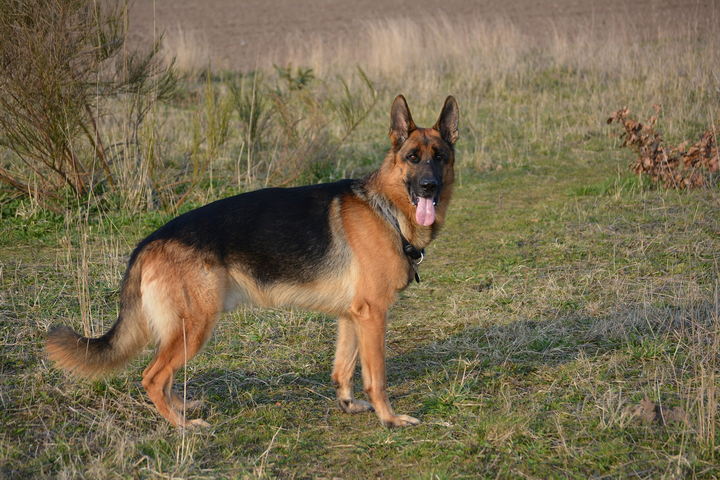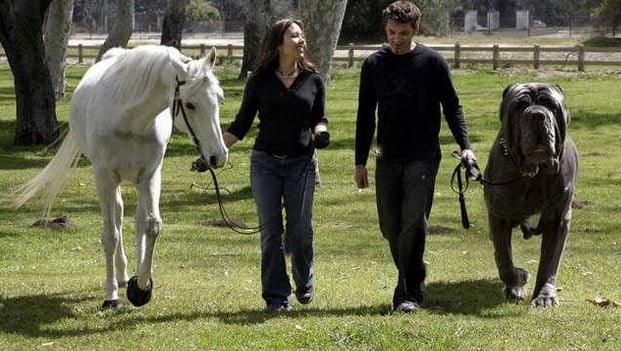German Shepherds are a loyal, intelligent, and versatile breed that’s captured hearts worldwide. Affectionately known as GSDs, are not just any ordinary dogs. They’re a mix of brains, brawn, and beauty, making them one of the most sought-after breeds for various roles – from loyal family companions to fearless working dogs.
Now, imagine a breed so versatile it excels in roles that range from police and military services to being the star of a family’s backyard. That’s your German Shepherd for you. With their keen intelligence and eagerness to please, they’re not just pets. They’re part of the family, part of the team, and for some, part of the workforce. But what makes them truly special? Is it their majestic stance, their unwavering loyalty, or their brilliant minds? Well, it’s all of that and more.
German Shepherds are known for their adaptability – whether it’s adapting to a family’s lifestyle or the rigorous demands of search and rescue work. They’ve got a work ethic that would put most to shame, combined with a level of loyalty that’s hard to match. But it’s not all work and no play. These dogs have a playful side that loves nothing more than a good game of fetch or a romp in the park. And let’s not forget their protective nature. A German Shepherd will go to great lengths to ensure their family’s safety, making them excellent watchdogs.
Yet, for all their strengths, German Shepherds are like any other breed when it comes to their health. They need care, attention, and regular check-ups to tackle any health issues head-on. It’s essential for potential owners to know about common health concerns, not as a deterrent, but as a way to prepare and provide the best care possible. After all, knowledge is power, especially when it comes to the well-being of our four-legged companions. Now, let’s move on to what you really need to know to keep these majestic creatures thriving.
10 – Hip Dysplasia
Hip dysplasia is a common concern in the world of German Shepherds. This condition is a bit of a party crasher, especially given how it affects the hip joints, leading to pain, lameness, and in severe cases, arthritis. It’s like the dog’s hip socket hasn’t been invited to the party, so it doesn’t fit snugly with the thigh bone. The main culprits? Genetics, rapid weight gain, and improper nutrition.
Preventing hip dysplasia starts with ethical breeding practices. Breeders need to screen their breeding dogs for hip dysplasia, essentially giving the no-go for those with the condition. As for you, the pet parent, keeping your German Shepherd at a healthy weight and engaging them in gentle exercise can keep their joints jiving smoothly. Think of it as helping your dog maintain its groove without overdoing the dance moves.
09 – Elbow Dysplasia
Moving from the hip to the elbow, elbow dysplasia is another joint issue that’s all too familiar for German Shepherds. Similar to its hip counterpart, it’s about a mismatch – this time in the elbow joint. Symptoms include limping, stiffness, and an overall reluctance to use the affected leg. It’s like your dog is saying, “No thanks, I’ll just sit this one out.”
The prevention playbook reads similarly here: ethical breeding is key. By selecting against this trait, breeders can reduce the incidence of elbow dysplasia. For the German Shepherd that’s already part of your family, maintaining a healthy lifestyle with appropriate exercise and diet is your best defense. This isn’t about training for a doggy marathon but ensuring regular, moderate activity to keep those joints healthy.
08 – Gastric Dilatation-Volvulus (Bloat)
Gastric Dilatation-Volvulus (GDV), or bloat, is a bit of a dramatic health issue that can turn into a life-threatening emergency without much warning. Imagine your German Shepherd’s stomach decides to do a full 180-degree twist – scary, right? Symptoms can escalate quickly, including a swollen belly, restlessness, and attempts to vomit without success.
Preventing bloat involves some lifestyle tweaks. Feeding your German Shepherd smaller, more frequent meals and avoiding heavy exercise right after eating can help keep their stomach where it should be. Think of it as avoiding a tummy tornado by not turning the playtime dial up to eleven immediately after dinner.

07 – Diabetes
When we talk about diabetes in German Shepherds, think of it as a sugar management issue. Signs to watch out for include excessive thirst, frequent urination, and weight loss despite a good appetite. It’s like your dog’s body has forgotten how to process their favorite snacks properly.
Keeping diabetes at bay involves a balanced diet and regular exercise. This duo works together like a well-oiled machine, helping manage your dog’s weight and insulin levels. Consider it a daily routine of good eats and active feats to keep your furry friend in tip-top shape.
06 – Epilepsy
Epilepsy in German Shepherds can be a bit of a puzzle. This neurological disorder causes recurring seizures that can range from mild to severe. Witnessing a seizure can be frightening, but understanding the condition is the first step toward management.
Stress management and regular veterinary care are crucial. While epilepsy might have your German Shepherd’s brain firing off unsolicited sparklers, maintaining a calm environment and adhering to a treatment plan prescribed by your vet can help manage the condition. It’s about keeping the brain’s party lights on a dimmer switch to avoid unexpected fireworks.
05 – Hemophilia
Hemophilia in German Shepherds is a genetic blood disorder that impedes the clotting process, leading to excessive bleeding from even minor injuries. This condition underscores the critical importance of genetic testing, especially for breeders. By identifying carriers of the disorder through comprehensive genetic screenings, breeders can make informed decisions to prevent the propagation of hemophilia in future generations. Ethical breeding practices not only enhance the genetic diversity and health of the breed but also ensure that potential owners are not faced with the challenges and heartbreak associated with this condition.
Prevention, in the case of hemophilia, is heavily reliant on responsible breeding. For German Shepherd owners, understanding the genetic background of their pet can help prepare for or mitigate the impacts of this condition. Collaboration with veterinarians to establish a care plan, including recognizing symptoms of excessive bleeding and immediate treatment options, is essential. This proactive approach enables owners to manage their dog’s condition more effectively, ensuring a better quality of life.
04 – Degenerative Disc Disease
Degenerative Disc Disease (DDD) presents a significant health risk for German Shepherds, characterized by the deterioration of spinal discs which can lead to pain, nerve damage, and even paralysis. The genetic predisposition of German Shepherds to DDD makes it imperative for owners to be vigilant about their dog’s spinal health. Regular veterinary check-ups can help in early detection and management of the condition, potentially slowing its progression and mitigating symptoms.
Management of DDD involves a multifaceted approach focusing on maintaining a healthy weight, engaging in appropriate, low-impact exercises, and possibly incorporating physical therapy or anti-inflammatory medications as prescribed by a veterinarian. These strategies are aimed at minimizing stress on the spine, alleviating pain, and preserving mobility. A balanced diet, coupled with a tailored exercise regimen, plays a pivotal role in supporting the overall health and well-being of German Shepherds living with DDD.

03 – Panosteitis
Panosteitis, often referred to as “growing pains,” is a condition affecting rapidly growing puppies, leading to intermittent lameness and discomfort. This condition is typically self-limiting, resolving as the dog matures, but it requires careful management to ensure the puppy’s comfort and proper development. Monitoring activity levels to prevent overexertion is crucial during this phase, as excessive play or exercise can exacerbate symptoms.
Veterinary oversight can provide valuable guidance on managing panosteitis, including pain management strategies and nutritional support to promote healthy bone development. Owners should be observant of their puppy’s behavior and mobility, ready to adjust activities and seek veterinary advice as needed to navigate this temporary, yet challenging, growth-related condition.
02 – Perianal Fistulas
Perianal fistulas can cause significant discomfort for German Shepherds, manifesting as painful sores around the anus. The condition may lead to troubling symptoms such as difficulty defecating, licking of the area, and a foul odor. A comprehensive approach to treatment, often involving both medical intervention and dietary management, is essential for alleviating discomfort and promoting healing. Antibiotics, immunosuppressive medications, and proper hygiene practices are commonly employed to manage the condition.
Diet plays a critical role in managing perianal fistulas, with some dogs benefiting from hypoallergenic or highly digestible diets to reduce gastrointestinal irritation and improve overall digestive health. Ongoing veterinary care is crucial to monitor the condition’s progression and adjust treatment plans as necessary, ensuring the best possible outcome for affected dogs.
01 – Skin Allergies
Skin allergies in German Shepherds can be triggered by a variety of factors, including environmental allergens, food sensitivities, and fleas. These allergies often manifest as itchy, irritated skin, leading to discomfort and an increased risk of secondary infections. Identifying and avoiding the triggers of these allergic reactions is paramount in managing the condition. Regular grooming, the use of hypoallergenic bedding and products, and a diet formulated to support skin health can all contribute to reducing flare-ups.
When avoidance of allergens is not entirely possible, veterinary interventions such as antihistamines, corticosteroids, or immunotherapy may be recommended to manage symptoms. Owners should work closely with their veterinarian to develop a comprehensive allergy management plan, incorporating both preventive strategies and treatments to ensure their German Shepherd’s comfort and health.
Enhancing the Well-Being of Your German Shepherd: Beyond Common Health Issues
Caring for a German Shepherd goes beyond addressing common health issues. It’s about creating an environment and lifestyle that nurtures their physical, mental, and emotional health. Here, we explore key areas to focus on:
- Regular Veterinary Check-ups: Preventive care is crucial. Routine visits to the vet for vaccinations, parasite control, and health screenings can catch potential problems early.
- Balanced Diet and Nutrition: Proper nutrition is the cornerstone of good health. Feed your German Shepherd a balanced diet rich in essential nutrients. Consider incorporating foods with omega-3 fatty acids for coat health, and glucosamine for joint support.
- Physical Exercise and Mental Stimulation: German Shepherds thrive on activity. Alongside physical exercise, engage them in training and activities that challenge their minds. Agility courses and advanced obedience training can be both fun and rewarding.
- Socialization and Emotional Well-being: Socialization from an early age is vital. Positive encounters with different people, animals, and environments can help prevent behavioral issues. Equally, regular interaction and bonding time with family members foster emotional stability.
- Grooming and Skin Care: Regular grooming is not just about keeping your German Shepherd looking good. It’s also a chance to check for any unusual signs on their skin or coat. Use hypoallergenic shampoos to avoid skin irritations.
- Dental Health: Oral health often goes overlooked. Dental care, including regular brushing and dental treats, can prevent gum disease and other oral health issues.
- Environmental Enrichment: Create a safe and stimulating environment. Access to a secure outdoor space, interactive toys, and varied landscapes can enrich their daily life.
By focusing on these additional aspects of care, we can ensure that our German Shepherds lead a balanced, healthy, and fulfilling life. Remember, a happy dog is a healthy dog. And by attending to their comprehensive needs, we pave the way for a joyful companionship.































































